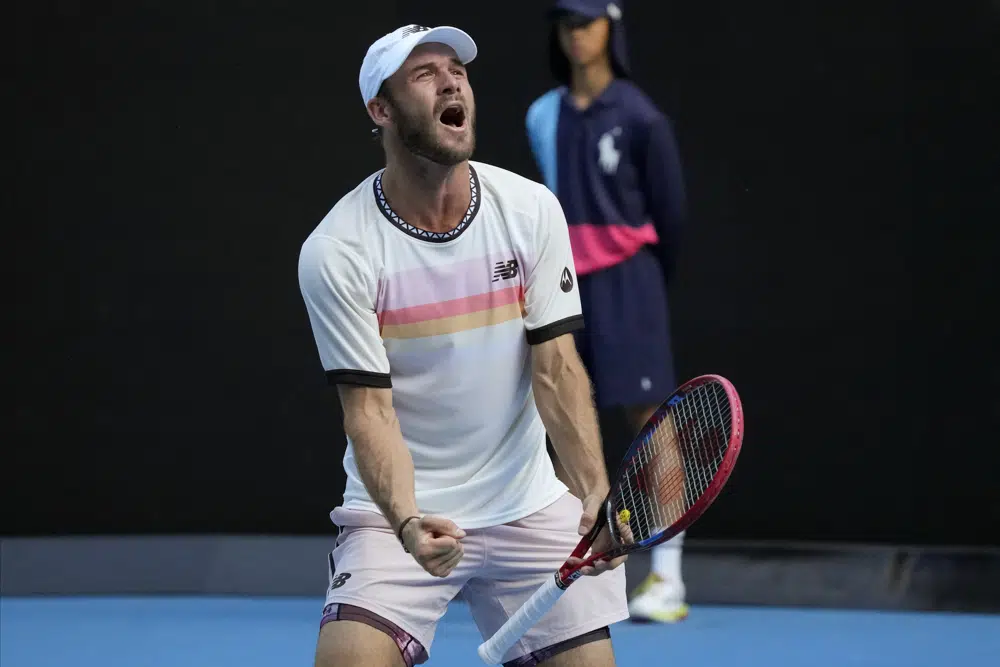
MELBOURNE, Australia (AP) — Tommy Paul was too little at the time to remember watching Andy Roddick win the 2003 U.S. Open, the last Grand Slam singles title for an American man.
Paul, now 25, does recall seeing posters from that triumph displayed at the club in North Carolina where he learned how to play tennis as a kid. What stood out the most, Paul said, was the Reebok outfit Roddick wore.
“I was actually salty when he switched to Lacoste. I was like, ‘He’s not going to win another Slam now,’” Paul said with a smile after reaching the semifinals at the Australian Open, where he will face Novak Djokovic of Serbia on Friday, after Stefanos Tsitsipas of Greece faces Karen Khachanov of Russia. “I thought it was the outfits.”
That championship at Flushing Meadows two decades ago remains the last in Grand Slam singles for any American man, although a trio of fellows named Roger Federer, Rafael Nadal and Djokovic probably (wink) had more to do with where the major trophies kept going over the rest of Roddick’s career — and beyond — than any clothing choices.
Paul’s run at Melbourne Park is one of the many examples of the ways in which U.S. men are suddenly relevant again in tennis.
“Since I was young, that’s all we’ve been hearing. Since like 14 years old, the coaches have been telling us, ‘We need new Americans. We need new Americans.’ It’s kind of engraved in my head,” Paul said, tapping his temple with his right index finger. “We all want to perform. … I mean, I think we all want it pretty bad for ourselves, but we want it for U.S. tennis, too.”
This breakthrough for Paul, who never had been past the fourth round at a major, comes on the heels of Frances Tiafoe’s trip to the semifinals at the U.S. Open last September, which included a victory over Nadal before a loss to eventual champion Carlos Alcaraz.
That makes this sequence the first time U.S. men reached the final four at consecutive Slams in 16 years, when Roddick was the runner-up to Federer at the 2006 U.S. Open and lost to him in the semifinals at the 2007 Australian Open.
There’s more evidence to support the idea that a country that produced Don Budge and Bill Tilden and Arthur Ashe and John McEnroe and Jimmy Connors and Pete Sampras and Andre Agassi and more but did not matter in men’s tennis in recent years — Serena and Venus Williams, along with others, made sure U.S. women stayed at the forefront — must be taken more seriously.
Consider:
— The Australian Open men’s bracket was filled with big wins by 20-something Americans, including Mackenzie McDonald beating defending champion and No. 1 seed Nadal, Jenson Brooksby beating No. 2 seed Casper Ruud, and Sebastian Korda beating the runner-up each of the last two years, No. 7 seed Daniil Medvedev;
— Paul, Ben Shelton, 20, and Korda, 22, became the first trio of Americans in the men’s quarterfinals in Melbourne since 2000;
— There was a stretch of 22 majors spanning about 4 1/2 years in which not a single U.S. man made the quarterfinals at any Grand Slam tournament, a drought that ended when Sam Querrey reached that round at Wimbledon in 2016;
— With Paul set to crack the top 20 for the first time by the end of the Australian Open, and big jumps by others, there are projected to be 10 Americans in the ATP top 50 on Monday, something that last happened in June 1995.
“I don’t see why, at the end of this year, we couldn’t have five, six guys in the top 20, with the way that some of these guys are playing,” said Shelton, who turned pro after winning the NCAA singles title as a sophomore at the University of Florida last year and made it all the way to the quarterfinals in Australia before losing to Paul in four sets Wednesday.
“There’s a lot of hope for American tennis,” Shelton said. “I’m really looking forward to being a part of it.”
When Paul finished off that victory, he was asked during his on-court interview at Rod Laver Arena about what fans back home might be thinking.
“It’s not just exciting for the American fans,” Paul said. “It’s exciting for fans all around the world. And for us, too. I’m really excited for Ben. I’m excited for all the players that are coming up.”
Djokovic agreed with the premise.
He thinks having successful players from the United States taking part in the latter stages of the biggest tournaments — and being part of the conversation at last — can only be a good thing for the popularity of tennis.
“America, for our sport, is an extremely important country. We have some of the biggest tournaments in the world played there, in the North American continent. I think it is important that we see successful American men and women doing well. America is producing, historically, always top players,” Djokovic said. “Now you have a list of maybe four or five young players that are knocking on the door of the top level. I think that’s great for our sport.”
